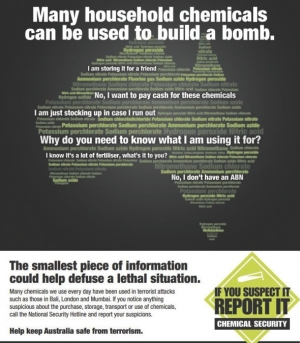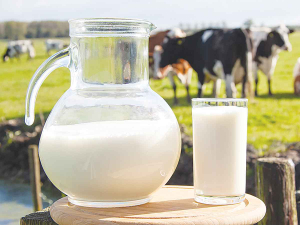A new national code of practice containing tips for businesses to assess and prevent chemical security risks has been welcomed by the National Farmers Federation (NFF).
The code, launched last month by Attorney-General Mark Dreyfus, highlights security gaps where chemicals could be taken and misused by terrorists.
Australian authorities have identified 96 chemicals of security concern. Of these, eleven have been identified as being particularly high-risk because they can be used to make homemade explosives. These eleven chemicals are the subject of the voluntary code.
Three chemicals – hydrogen peroxide, nitric acid and sodium azide – are used in the dairy industry. Potassium nitrate is used by fertiliser manufacturers.
NFF chief executive Matt Linnegar says farmers rely on having access to safe and effective chemicals as they help control pests, weeds and diseases.
“There are strict laws governing the handling, use, transport and storage of chemicals on farms, and the NFF has worked with the Government on this initiative to ensure it aligns with the existing tight regulatory arrangements for agricultural chemicals.
“This is not about making it harder for farmers to access chemicals, but rather about farmers keeping an eye out for anything suspicious and reporting it to the National Security Hotline on 1800 123 400,” says Linnegar.
As part of development of the code, the Australian Government has assessed a number of chemicals of security concern, many of which are important to farmers, helping them to sustainably produce food and fibre.
“As one of the largest users of chemicals in Australia, farmers already play a crucial role in ensuring they monitor the security of chemicals on their farms, including keeping them stored in dedicated, lockable storage areas,” says Linnegar.
“Farmers are also encouraged to report anything suspicious, including unauthorised access to private property and any chemical theft, to the authorities.
“Farmers, like all Australians, can play a role in helping to keep the country free from terrorism.”
Dreyfus says the code is for importers, distributors, transporters, universities, farmers, hardware stores, pool chemical suppliers and any other sector using these chemicals.
“We have worked with industry to develop a voluntary code that can be incorporated into existing security management procedures,” he says.
“We all want to make sure that Australia remains a safe and resilient country. Good security is good for business. Not only does it protect valuable stock, it also helps keep Australians safe.”

















